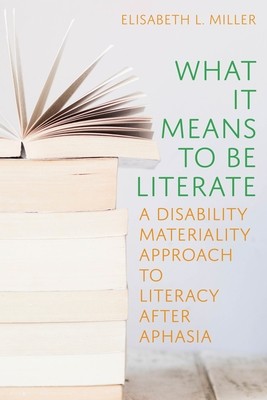
- We will send in 10–14 business days.
- Author: Elisabeth Miller
- Publisher: University of Pittsburgh Press
- ISBN-10: 0822947234
- ISBN-13: 9780822947233
- Format: 15.8 x 15.8 x 0.8 cm, hardcover
- Language: English
- SAVE -10% with code: EXTRA
Reviews
Description
Disability and literacy are often understood as incompatible. Disability is taken to be a sign of illiteracy, and illiteracy to be a sign of disability. These oppositions generate damaging consequences for disabled students (and those labeled as such) who are denied full literacy education and for nonliterate adults who are perceived as lacking intelligence, knowledge, and ability. What It Means to Be Literate turns attention to disabled writers themselves, exposing how the cultural oppositions between disability and literacy affect how people understand themselves as literate and even as fully human. Drawing on interviews with individuals who have experienced strokes and brain injuries causing the language disability aphasia, Elisabeth L. Miller argues for the importance of taking a disability materiality approach to literacy that accounts for the embodied, material experiences of disabled people writing and reading. This approach reveals how aphasic writers' literate practices may reinscribe, challenge, or even exceed scripts around the body in literacy (how brains, hands, eyes, mouths, voice boxes, and more operate to make reading and writing happen) as well as what and how spaces, activities, tools, and materials matter in literate practice. Miller pushes for a deeper understanding of how individuals' specific bodies always matter for literate practice and identity, enabling researchers to better account for, and counter, ableist literate norms.
EXTRA 10 % discount with code: EXTRA
The promotion ends in 19d.13:06:09
The discount code is valid when purchasing from 10 €. Discounts do not stack.
- Author: Elisabeth Miller
- Publisher: University of Pittsburgh Press
- ISBN-10: 0822947234
- ISBN-13: 9780822947233
- Format: 15.8 x 15.8 x 0.8 cm, hardcover
- Language: English English
Disability and literacy are often understood as incompatible. Disability is taken to be a sign of illiteracy, and illiteracy to be a sign of disability. These oppositions generate damaging consequences for disabled students (and those labeled as such) who are denied full literacy education and for nonliterate adults who are perceived as lacking intelligence, knowledge, and ability. What It Means to Be Literate turns attention to disabled writers themselves, exposing how the cultural oppositions between disability and literacy affect how people understand themselves as literate and even as fully human. Drawing on interviews with individuals who have experienced strokes and brain injuries causing the language disability aphasia, Elisabeth L. Miller argues for the importance of taking a disability materiality approach to literacy that accounts for the embodied, material experiences of disabled people writing and reading. This approach reveals how aphasic writers' literate practices may reinscribe, challenge, or even exceed scripts around the body in literacy (how brains, hands, eyes, mouths, voice boxes, and more operate to make reading and writing happen) as well as what and how spaces, activities, tools, and materials matter in literate practice. Miller pushes for a deeper understanding of how individuals' specific bodies always matter for literate practice and identity, enabling researchers to better account for, and counter, ableist literate norms.


Reviews